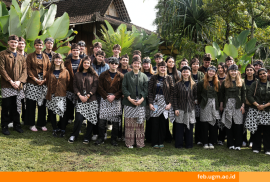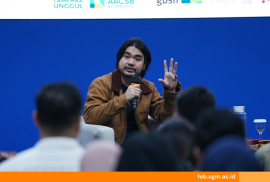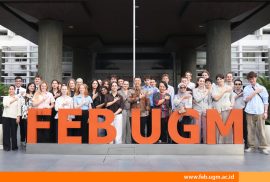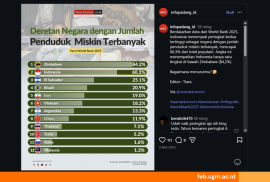Friday (21/7), Department of Economics of the Faculty of Economics and Business, Universitas Gadjah Mada (FEB UGM), again held a Seminar and Public Lecture (SinarKU) with the theme “Social Protection in Developing Countries: Lessons from Indonesia”. Quoting Franklin D. Roosevelt, the 32nd President of the United States (US), “The test of our progress is not whether we add more to the abundance of those who have much; it is whether we provide enough for those who have too little.” So in order to manifest this, this time SinarKU discusses the application of social protection, as well as insights that can be learned from an analysis of its mechanisms in Indonesia.
SinarKU, this time, presented Prof. Rema Hanna, Jeffrey Cheah, Professor of South East Asian Studies, Harvard and moderated by Wisnu Setiadi Nugroho, PhD, lecturer in the Department of Economics. Prof. Hanna started the lecture by explaining the definition that social protection refers to government initiatives and policies designed to provide a safety net for vulnerable populations, with the aim of reducing poverty, improving livelihoods, and reducing inequality. This includes programs such as cash transfers, food assistance, access to health care, and educational support. Prof. Hanna also explained in retrospect that social protection is significant, especially during economic shocks or crises, such as the COVID-19 pandemic.
Then, as an initial comparison, Prof. Hanna explored that in the US context, social protection mechanisms mainly operate through various welfare programs and social insurance systems. Programs such as Social Security, Medicare, and Medicaid form the backbone of social protection in the US. In more detail, Social Security offers retirement and disability benefits for retirees, survivors, and individuals with disabilities. On the other hand, Medicare provides health insurance for older people, and Medicaid expands access to health care for low-income individuals. These programs aim to provide financial security, access to health care, and reduce poverty, especially for the elderly and marginalized groups. However, in recent years, the US has sponsored discussions about expanding its social protection mechanisms, particularly regarding income inequality and disparities in access to health. Proposals for universal health insurance, affordable education, and increases in the minimum wage are mooted, driven by goals of increasing social safety nets and reducing poverty.
Prof. Hanna then referred to cases in developing countries, namely in Indonesia. In this country, social protection programs have undergone significant developments to address the country’s diverse needs and challenges. Indonesia has several programs targeting various groups, including a conditional cash transfer program (PKH) for low-income families, a Staple Food Card program for poor households, and health insurance coverage through the National Health Insurance System (BPJS Kesehatan). These initiatives aim to provide financial assistance, food security, and access to healthcare to Indonesia’s vulnerable population.
However, Indonesia still needs to work on expanding the scope and effectiveness of its social protection programs. Issues such as targeting accuracy, program fragmentation, and inadequate funding hindered the potential impact of these initiatives. In addition, Indonesia’s decentralized governance structure poses challenges in coordinating and uniformly delivering social protection services across different regions. She explained that social protection is economically justified by social safety net theory and poverty reduction.
Prof. Hanna then concluded that both in the United States and in developing countries such as Indonesia, social protection is recognized as a means of overcoming inequality, reducing poverty, and ensuring fundamental human rights. However, the level and effectiveness of these programs differ due to variations in economic development, governance structures, and social norms. The two countries continue to discuss the optimal design and scope of social protection mechanisms to ensure equitable outcomes for society. In essence, it is necessary to expand and optimize social protection mechanisms that are driven by the common goal of alleviating poverty, increasing equality and improving welfare holistically.
Reportage: Hayfaza Nayottama
Watch the full video: https://youtu.be/SYPEu9L4HJI




